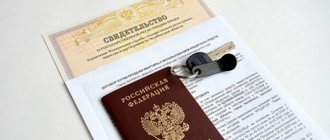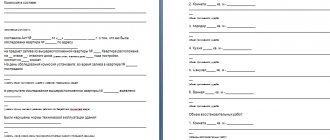Home / Housing disputes / Power of attorney for privatization of an apartment, housing
Privatization of a municipal apartment takes a lot of time and effort. Instead of doing everything themselves, many people draw up a notarized power of attorney for privatization. The representative indicated in it assumes responsibility for transferring the housing into private ownership. Legal actions are performed strictly in the interests of the principal, i.e. one who has issued a power of attorney and transferred part of his powers to another person.
The document is drawn up in accordance with the rules: the absence of a signature, details of the parties or a violation of the structure makes the power of attorney void. Therefore, problems may arise with privatization.
How to write a power of attorney for the privatization of an apartment? Does it need to be certified by a notary? What documents are needed for this? We will examine these and other pressing issues in our article.
✅ In what cases is a power of attorney needed?
Privatization of municipal housing involves the participation of interested parties who are indicated in the social tenancy agreement and have rights to registration. Usually there are several such citizens: the employer and his family members. The apartment is transferred into ownership on the basis of shared ownership. The privatization agreement is signed by all parties to the transaction (see “Who has the right to privatize an apartment”).
But what if they don't have time for this or are unable to sign due to physical illness?
This is why a power of attorney exists - a document issued by the principal in the name of the attorney for the purpose of fulfilling legal obligations (Clause 1 of Article 185 of the Civil Code of the Russian Federation). One of the responsibilities is considered to be the privatization of an apartment in the interests of the principal. However, permits can be different: to drive a vehicle, to sign, to receive goods, to register with the traffic police, etc.
When can you issue a power of attorney for the privatization of housing:
- If there is a lack of time (for example, due to being busy at work);
- Being treated in a hospital (in case of illness);
- Stay in another city or abroad (work, study, vacation);
- Minor age.
Situations may be different, but the main ones are presented above. A separate power of attorney must be drawn up for each reason.
Example: A woman who is in the last months of pregnancy is participating in privatization. If a woman in labor cannot personally collect documents and sign an agreement with the administration, she can write a power of attorney to a notary, lawyer, spouse or third parties. The reason is staying in the maternity hospital. If a man who is away due to rotational work participates in this privatization, he must draw up his permission - choose a representative and entrust him with conducting the privatization in his favor.
Purpose of compilation
A power of attorney can be drawn up and signed by any participant in the privatization procedure .
It is especially necessary for those persons who are far from the place where the registration of living space as property takes place.
adult and child aged 14 to 18 to participate in collecting papers or submitting them to government agencies .
If the participant is a minor under 14 years of age, the authority to collect documents and submit an application rests with his parents or legal representatives. In this case, there is no need to draw up a power of attorney from the child.
If the parent does not participate in the process himself, he must issue a power of attorney on his own behalf , indicating that the interests of his child will be represented during the registration of real estate.
You can learn how to privatize an apartment through the MFC from our article.
✅ Types of powers of attorney
There are several types of powers of attorney:
- One-time - involves performing a single operation in the interests of the principal (for example, submitting a package of documents for privatization to the Housing Services Department of the Ministry of Defense of the Russian Federation);
- Special – obliges the attorney to perform homogeneous legally significant acts (for example, request a certificate for transferring an apartment into private ownership);
- General (general) – empowers the trustee to carry out any actions related to the privatization of municipal housing.
There are other, less popular powers of attorney - with and without the right of substitution (Article 187 of the Civil Code of the Russian Federation). Example: delegating a number of functions to a lawyer or notary. Information about this is indicated in advance in the original document.
✅ Is it possible to privatize an apartment using a general power of attorney?
Privatization requires applicants to perform several legal operations: collecting documents, drawing up applications, contacting the BTI, administration, Rosreestr, ordering a technical plan and many others. If you can submit a request yourself, but do not want to collect information, it is better to issue a special power of attorney. However, if you need to privatize an apartment, as they say, “from” and “to”, you can draw up a general document.
Expert opinion
Semyon Frolov
Lawyer. 7 years of experience. Specialization: family, inheritance, housing law.
The main difference between a general power of attorney and a one-time and special power of attorney is the legal powers of the attorney. The representative has the right to perform any actions, sign, and request documents. The duties of the trustee are specified in the general power of attorney. Lawyers advise not to limit yourself to a general formulation like “take action to privatize an apartment”, but to indicate specific responsibilities.
For example, an attorney undertakes...
- notify other privatization participants;
- prepare applications/notarial waivers;
- collect documents for an apartment, housing;
- submit an application to the administration;
- sign the real estate transfer agreement, etc.
This makes it much easier to control the actions of the attorney, and in case of excess of authority, to immediately stop his activities.
A general power of attorney is much more extensive than the others, but there are also disadvantages to using it:
- Risks - the powers of a general permit are much broader than those of a regular permit - this is freedom for scammers who can re-register an apartment in their name and then sell it to third parties;
- Cost - on average from 3,000 to 5,000 rubles (depending on the region);
- The validity period is only 1 year, unless otherwise stated in the document.
But at the same time, a general power of attorney allows you to privatize an apartment without the participation of the main applicant. For example, someone who is abroad, undergoing treatment, or on vacation.
Content
There is no single, strict sample of this paper. However, each type contains a number of features and must also correspond to a certain pattern. Notaries who certify it provide samples for drawing up , so in each case you can seek advice from them.
The power of attorney must contain the following mandatory items :
- Data of the principal and authorized representative (full name, passport data, registration information).
- Date of preparation.
- A list of powers of the trustee, including the exact name of the bodies to which he is authorized to apply.
- Validity.
Information about the notary.- A receipt from the principal stating that the consequences of the transfer of authority are known and understood to him.
The document is filled out personally by the principal by hand. The notary certifies the document and enters information about it into the register, after which it is assigned a registration number.
Particular attention should be paid to listing the powers of the trustee . If any point is missed, the preparation process may be delayed or a new power of attorney will have to be issued.
At the same time, unnecessary clauses that may be included in a power of attorney by mistake can lead to excess of authority and unpleasant consequences for the principal.
Notary offices provide special forms in which the necessary information is entered.
A sample application for privatization of an apartment, as well as refusal to participate in it, can be found on our website.
✅ Sample power of attorney for privatization of an apartment
There is no single document template. Nevertheless, the power of attorney for privatization is drawn up in accordance with the rules of document flow. The form can be obtained from notaries. Before doing this, it wouldn’t hurt to familiarize yourself with what a power of attorney looks like and what it consists of?
Below are the latest forms and a sample of filling out the document for 2021:
Please note that the power of attorney for the privatization of housing is filled out personally by the principal. Notaries require that both parties to the transaction be present when the document is drawn up (but this is not required). It is important to determine the free will of the participants - if the notary feels that the power of attorney is being drawn up for selfish purposes (for example, only in the interests of the attorney), he will not certify the document.
The approved power of attorney is entered into the unified register of notarial documents. The agreement is assigned a unique number. Subsequently, the document can be easily found in the notary’s EIS - in case one of the parties starts legal proceedings.
Read in what cases and how can you challenge privatization?
General provisions on privatization
All residents registered in the municipal square can declare their civil rights. If a citizen refuses to participate in the program and does not want to become an owner, then he is obliged to formalize the refusal with a notary. The specialist knows how to write the application correctly and will certify it in the right way. The refusal of privatization will be submitted to the privatization body of the municipal housing committee.
The refused share is distributed equally among the remaining applicants registered in the apartment. Sometimes all registered people write a notarized refusal in favor of one family member. Children participate in privatization without fail; after reaching adulthood, they are given the right to re-participate in the program.
The interests of young children are represented by their legal representatives: parents or guardians. If an adult participant is absent at the required time or does not have the physical ability to visit institutions and collect certificates, then a trusted person can do this. Citizens issue a power of attorney to carry out privatization actions, collect documents and provide information to authorities. A power of attorney can be issued by all residents for one person, not necessarily the resident.
The notary provides a paid service and issues a document, which is provided in all places of request. For example, a family member is in prison, on active duty in the army or in a hospital. It may be necessary to issue a power of attorney simply because in the absence of a registered family member, privatization will not be carried out. The law strictly protects the interests of all citizens equally, so it is impossible to secretly become owners and hide it from one member.
Sometimes conflicts arise in families due to the fact that one of the members ignores the interests of the others and does not give his consent or refusal. No one can help in such a situation; you need to look for a compromise.
The law allows privatization to be carried out by a trusted person; there is nothing prohibited here. You can issue a power of attorney to collect information and provide a package of documents for the intended purpose.
✅ Documents for issuing a power of attorney
The drafting of a document is subject to general rules. The parties must express a desire to issue a power of attorney. Only in case of mutual benefit do they turn to a notary.
What documents will be needed:
- original + copy of the principal's passport;
- a copy of the authorized person’s passport (sometimes passport data written down on paper is sufficient).
Executing a power of attorney for the privatization of an apartment does not require documents for housing (for example, as when buying and selling). Copies of passports of both parties are sufficient.
Sample and documents
Below is a sample of the paper being studied. A power of attorney usually looks like this.
To participate in privatization, the following documents will be useful:
- passports of the parties;
- powers of attorney (if any);
- marriage and birth certificates;
- refusals to participate in privatization;
- social rental agreement;
- certificate form No. 9;
- extract from the house register;
- warrant for the apartment (if any);
- cadastral and technical passport;
- statement;
- certificates of non-participation in privatization;
- documents on ownership of all housing that the applicants have.
In reality, everything is not as difficult as it seems. On average, a request is processed for about a month. After this, as we have already said, you can conclude a privatization agreement and register ownership rights in the State Register.
✅ Cost
The price for issuing a power of attorney depends on the region of residence. Prices are set by notary offices - in accordance with Art. 333.24 Tax Code of the Russian Federation. Now the cost of certification of a power of attorney is 200 rubles . However, notaries perform technical work, so the price can reach up to 1,500 rubles - for ordinary notaries; about 4,000 rubles – for general employees.
There are cases when the principal cannot visit the notary's office in person. All that remains is to call a notary to come to you - on-site certification of agreements is much more expensive. The client will have to pay for travel, accommodation, expenses and other actions.
In order not to incur additional costs, the law provides for the following: according to Art. 185.1 of the Civil Code of the Russian Federation, the certificate can be entrusted to chief doctors, doctors on duty at military units, commanders, heads of colonies, commanders of ships and aircraft. They have the same functions as notaries.
You can also find out: “How much does it cost to privatize an apartment?” or “How much does it cost to privatize land?”
Privatizing an apartment by proxy is the best way to register ownership of a home if you are short of time. The parties are the principal and the attorney. They can draw up a one-time, special or general power of attorney - and also indicate the delegation of the functions of a representative. The document is certified by a notary or a person replacing him.
Questions may arise during registration.
For example, is it possible to privatize an apartment for one tenant with a power of attorney from all? Can a fiduciary act on behalf of the principal? How to limit the powers of a representative? What to consider when transferring? Answers to these and other questions can be obtained from the lawyers of our website. They will help with the power of attorney, point out the risks, tell you how to avoid them and what documents are needed. Contact us, consultations are free! Attention!
- Due to frequent changes in legislation, information sometimes becomes outdated faster than we can update it on the website.
- All cases are very individual and depend on many factors. Basic information does not guarantee a solution to your specific problems.
That's why FREE expert consultants work for you around the clock!
- via the form (below), or via online chat
- Call the hotline:
- 8(800)302-39-65
— All residents of the Russian Federation - +7(495)128-69-80
— Moscow and the Region - +7(812)509-13-65
— St. Petersburg and region
- FREE for a lawyer!
By submitting data you agree to the Consent to PD Processing, PD Processing Policy and User Agreement.
Anonymously
Information about you will not be disclosed
Fast
Fill out the form and a lawyer will contact you within 5 minutes
Tell your friends
Rate ( 1 ratings, average: 5.00 out of 5)
Author of the article
Maxim Privalov
Lawyer. 2 years of experience. I specialize in civil disputes in the field of housing and family law.
Author's rating
Articles written
614
Invalidation
You need to be aware that it is possible to cancel the power of attorney early, as well as declare it invalid under certain circumstances. These circumstances are the same for all types of this document and apply to any person:
- Revocation of a power of attorney at the request of the principal at the notary's office;
- Expiration of the document;
- Impossibility of registering privatization (for example, a power of attorney was issued before the consent of government agencies was given);
- Issues with incapacitated and minor persons have not been resolved;
- The document is formatted incorrectly;
- Availability of evidence of coercion to draw up a power of attorney;
- The principal died before the privatization process was completed.
No notary has the right to issue powers of attorney on behalf of a minor child. Interested parties can challenge illegal actions in court if they have sufficient confirmed grounds.









